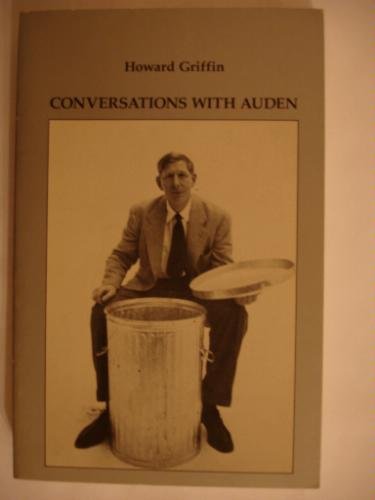Auden on Hitler and Napoleon: “Their fatality is being what they are.”
Wednesday, August 8th, 2012Some time ago I wrote about Howard Griffin‘s Conversations with Auden. I’m not sure I ever had read the front matter before tonight. Had I done so, I would have learned that the young poet Griffin took these notes using a kind of shorthand (W.H. Auden would never have allowed a tape recorder) in 1946 and 1947, then transcribed them painstakingly with Peter Eckermann‘s Conversations with Goethe in mind as a model. They were highly regarded by literary circles in the 1950s. Another poet, Marianne Moore, said “these discussions … profitable to me if no one else…”
The volume begins with this question:
Howard Griffin: Would you rather have lived at an earlier time when men knew less, when there was no police force, no plumbing?
W.H. Auden: I would not. If one thinks in terms of happiness or love, human behavior certainly has not improved through the ages, but if one thinks in terms of knowledge, power and potential for good, one must say: there has been an advance.
This was in 1946-47, remember. World War II was still a living wound; the avalanche of facts and photos and eyewitness accounts about it had yet to be published. Auden had this take on Adolf Hitler:
 “Although he seemed to be always telling other people what to do, Hitler’s acts were determined by compulsion and desire for prestige. Men like Hitler, Napoleon and Richard III contrive to make their surroundings sufficiently exciting so that they are sustained in a state of passion, which dictates what they will do. People like Hitler have a hunger for complete mastery and when things begin to go wrong, then there is nothing for them to do but wish their death. The Hitler type is able to choose for others, but incapable of self-choice and he must go on arousing enemies because their fact proves that he exists. When we read of the night of the long knives, the SS slogan ‘Heads must roll,’ the Rohm purge, etc., we see that the Nazi leaders contrived to do evil consciously for its own sake in order to demonstrate their objective reality … Once they get started, they cannot stop. Their fatality is being what they are; they are their own disease …. For the dictator, war is a good thing; then he feels wanted. He has a hunger to be needed. A war provides people with a negative sense of self – enough self to destroy. What Hitler, Napoleon and Alexander lacked was a consciousness of their finiteness, a lack that can be disastrous …”
“Although he seemed to be always telling other people what to do, Hitler’s acts were determined by compulsion and desire for prestige. Men like Hitler, Napoleon and Richard III contrive to make their surroundings sufficiently exciting so that they are sustained in a state of passion, which dictates what they will do. People like Hitler have a hunger for complete mastery and when things begin to go wrong, then there is nothing for them to do but wish their death. The Hitler type is able to choose for others, but incapable of self-choice and he must go on arousing enemies because their fact proves that he exists. When we read of the night of the long knives, the SS slogan ‘Heads must roll,’ the Rohm purge, etc., we see that the Nazi leaders contrived to do evil consciously for its own sake in order to demonstrate their objective reality … Once they get started, they cannot stop. Their fatality is being what they are; they are their own disease …. For the dictator, war is a good thing; then he feels wanted. He has a hunger to be needed. A war provides people with a negative sense of self – enough self to destroy. What Hitler, Napoleon and Alexander lacked was a consciousness of their finiteness, a lack that can be disastrous …”
These conversations were published in literary journals, but never found a publisher – at least not in Auden’s lifetime. Nor in Griffin’s. He died in 1975, two years after Auden’s death, also in Austria.





